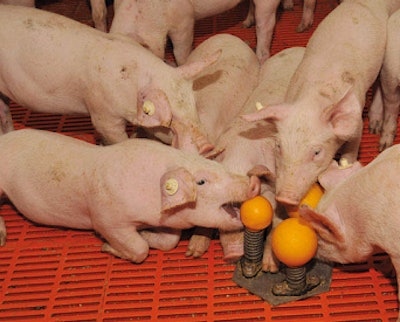
In cooperation with Kassel University and WEDA Dammann and Westerkamp, specialists for pig house equipment from Lutten have developed a new kind of flexible material for piglet and fattening pig toys. By using the rooting cones and pushing balls made of bite-resistant and food-safe polyurethane and mounted to floor and brackets, the animals can act out their natural play instinct and can busy themselves while standing up, sitting or lying down.
Tested in various pig houses, the animals' dealing with the cones has until now shown consistently positive results. In particular, reoriented behavior patterns like tail-biting are reduced due to the satisfied rooting instinct. This is mainly relevant because starting in 2016, tail cropping will be prohibited in German pig houses.
Scientific findings also prove the practical suitability of the toys. In test groups with rooting cones, the animals used the cone significantly more than other animals used the classical chain or ball. Consequently, the atmosphere in the rooting cone groups is clearly more tranquil than in the comparison groups. The injuries have also clearly visibly declined for animals using the cone. The results of this "screening" (visible scratch marks) have been fully taken into account during product development.
The rooting cones for piglets measure 60 millimeters in diameter, and the cones for fattening animals have a diameter of 80. The balls are mounted on a stable plastic ground plate with flexible metal springs. Fixed that way, the movements of the balls ensure variety and resistance so that the animals remain in the center of the house and do not evade into the corners.
The pushing balls were developed in direct connection with the rooting cones. "We were well aware of the demand of pig farmers for suitable manipulable material, especially for the farrowing section and service station", explains Ralf Meyer, WEDA's development manager.
The pushing balls are available in ¾-inch and 1-inch sizes, and can be installed at the pipes of the farrowing cages or feeding/resting pens without the need to remove equipment. "The acceptance of pig farmers for these toys does not least result from the hygiene properties and from a manufacturer-independent use of the low-noise balls", adds Ralf Meyer.
The detailed results of the scientific study will soon be published by WEDA Dammann and Westerkamp.

















